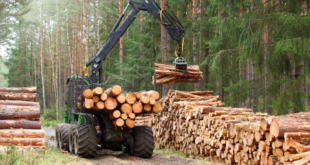To download a PDF of this story, click here. To download the Outdoor Living Selling Guide, visit hardwareretailing.com/outdoor-resources.
Light Up the Yard and Fire Up the Grill
Five Trends Taking Over Outdoor Spaces
The backyard has always been recognized as a spot for people to enjoy barbecuing and playing outdoor games on blue-skied summer days and to light a fire for warmth and roasting marshmallows on cool fall nights. More recently, however, consumers are showing a growing willingness to invest in their backyards to create comfortable, entertaining extensions of their homes.
“Blending outdoor and indoor living continues to be one of the country’s most predominant home trends,” according to the Hearth, Patio & Barbecue Association (HPBA), a U.S. trade association that represents hearth appliance manufacturers, designers and retailers.
Since merging indoor and outdoor living spaces continues to gain popularity, retailers need to understand what’s trending so they can meet consumers’ needs.
To explain the outdoor design elements capturing consumer interest, Hardware Retailing gathered data and trends from consumers, independent home improvement retailers and organizations such as HPBA and spoga+gafa, a garden trade fair in Cologne, Germany. Key takeaways from these trends can be found on the following pages.
To access a selling guide and the studies and information referenced in this article, visit hardwareretailing.com/outdoor-resources.
Motivations for Change
The main trend creating opportunity for retailers in the outdoor living sector is the fact that today’s homeowners seem willing to sacrifice indoor space as long as they can do some of their living outdoors. In fact, houses are shrinking in size by nearly 10 percent, according to the National Association of Home Builders.
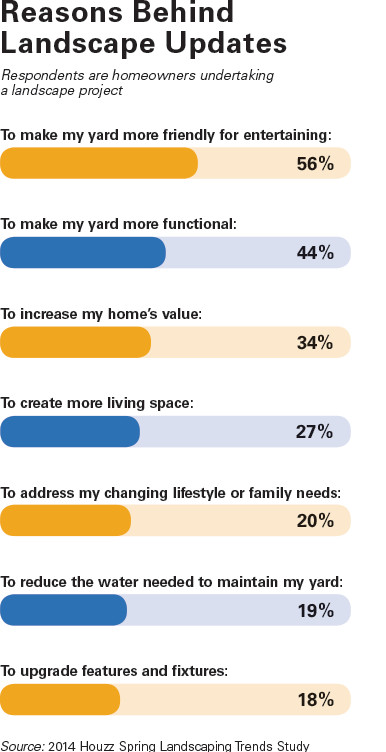
In addition to expanding on their living spaces, homeowners are making outdoor updates to create grand entertainment spaces and increase their yards’ overall functionality. Additional motives for backyard updates can been seen in the graph to the right.
“Porches, patios, decks and balconies are among the most cherished spaces of American homes, and we want to spend as much time enjoying them as possible,” Jackie Hirschhaut, vice president of public relations and marketing for the American Home Furnishings Alliance (AHFA), says. “Many of us have so little time off that our backyards and balconies have become our primary refuge for relaxation.”
Houzz, an online platform that provides home remodeling research, conducted a landscaping study that reinforces Hirschhaut’s point, with 56 percent of respondents updating their yards to make them more friendly for entertaining. Homeowners are adding patios, barbecues or fire pits. Some are transforming their yards into highend living spaces by installing outdoor kitchens and sound systems.
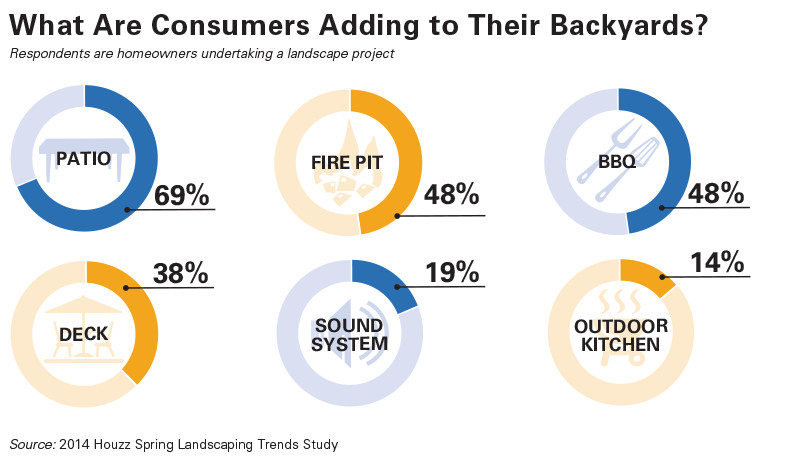
Now that we understand what is motivating consumers to make these outdoor updates, we will examine five different projects they are engaging in.
 Consumers
Consumers
Houzz data shows one of the top three items being added to outdoor areas are barbecues or grills. In 2013, nearly 80 percent of households owned an outdoor grill or smoker, according to HPBA.
Of the consumers who purchased grills in 2013, nearly half were buying replacement grills and almost one-third were purchasing an additional grill, showing that consumers are regularly looking to improve or expand what they own, according to the Hearth, Patio & Barbecue Association.
Retailers
The NRHA 2015 Outdoor Living Trends Study shows that retailers understand consumer demand, which is why gas and charcoal grills are the top two outdoor living products they stock in their stores. Gas grills contribute the most to overall category sales, according to the NRHA study.
While grills in general are top-selling products, unique grills are growing in popularity. When retailers were asked to identify different trends they’ve noticed in their outdoor living departments, more than a quarter of respondents identified an increase in grill sales, especially on higher-end and portable grills, for the NRHA study. Many retailers mentioned Big Green Egg and Weber as some of the top trending products.
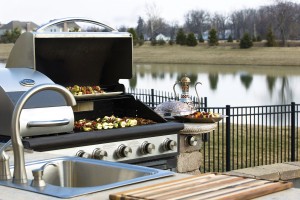 Experts
Experts
The popularity of high-quality portable grills align with trends experts are noticing.
Consumers want grills that are easy to set up and break down, which is why portable grills for tailgating and camping are trending, according to experts at the Hearth, Patio & Barbecue Association’s annual expo.
When industry observers from the spoga+gafa garden fair released outdoor trends for 2015 and 2016, they noted that experimentation with foods on the grill is something more consumers are enjoying.
Rather than sticking with burgers or sausages, consumers are testing out pizzas and other foods on the grill. These cooking experiments are contributing to the growing popularity of high-end grills.
Ceramic grills, water smokers and built-in grills are getting more attention, and portable grills have become hot items, as well, according to spoga+gafa.
 Consumers
Consumers
Lighting can enhance the mood of an area, highlight different architectural elements or simply provide safety along a path. Lighting trends have made some shifts with the increasing accessibility of LED lights and solar lights. Understanding how consumers are using lighting in their backyards can help you meet their needs.
Lighting is important for many homeowners, as 65 percent of them taking on an outdoor project are updating lighting, according to a Houzz study. Of those homeowners, seven in 10 are lighting their deck or patio while others are using lighting around paths.
A majority of lights that consumers are purchasing are eco-friendly. LED lighting is most popular in rural and suburban areas whereas solar-powered lighting is more popular in urban areas.
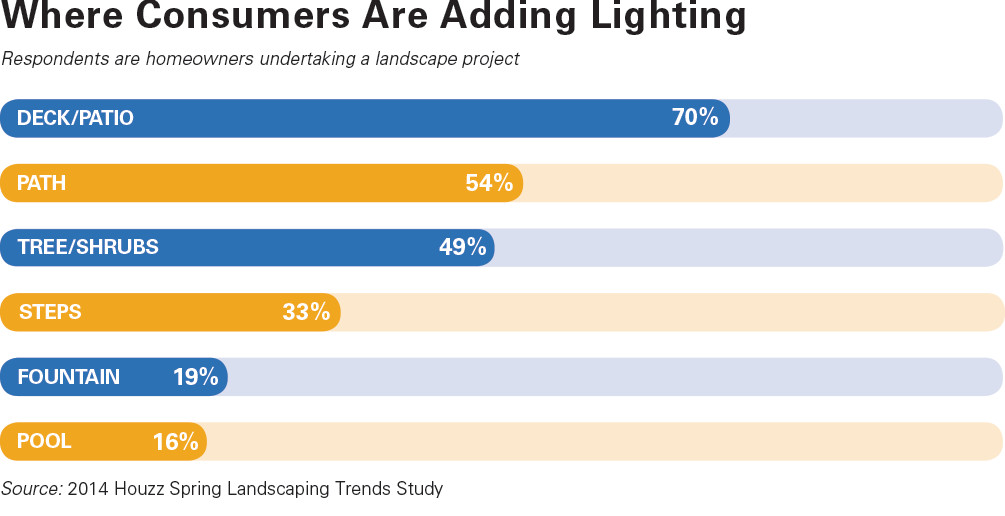
Retailers
Lighting is a common addition in outdoor living projects and 77 percent of retailers who have outdoor living categories stock exterior lighting products in their stores, according to the NRHA survey. While there are a variety of lighting options available, ranging from floodlights to pendant lights, retailers identified solar lights as gaining notable growth in sales and consumer interest.
Experts
In the American Society of Landscape Architects’ (ASLA) 2015 trends study, lighting ranked second in most popular design elements for the year. And experts at Houzz identified lighting as a way to enhance the outdoor mood.
“With the right lighting, the play of light and shadow gives your outdoor space an intriguing, romantic ambience,” Houzz says in its Top Outdoor Living Trends for 2015 Report.
The National Hardware Show® resource Industry Edge indicates that consumers are coordinating outdoor lighting with homes’ interior designs, tying in to the larger trend of creating harmony between the two spaces.
 Consumers
Consumers
Data from both Houzz and the data from both Houzz and Furnishings Alliance report shows that fire pits are an element many consumers are adding to their backyards. In fact, adding a fire pit has emerged as the fourth most popular DIY project in 2014, according to DIY Network.
Fire pits and fireplaces are being added for multiple reasons, such as cooking s’mores and hot dogs and keeping away bugs, but most importantly, they provide warmth, which helps extend the outdoor season. In some climates, fire features even give homeowners the opportunity to enjoy their patio year-round.
Retailers
On average, 66 percent of retailers who carry outdoor living products sell fire pits. Even more retailers recognize that customers are asking specifically for these products. Some respondents to the NRHA survey noted that customers are seeking built-in fire pits, gas fire pits and galvanized metal campfire rings.
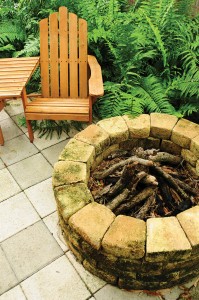 Experts
Experts
Ranked the most popular outdoor design element in ASLA’s 2015 trends study, fire pits and fireplaces are expected to be the must-have items this year.
Fire features, whether powered by gel, gas or wood, are making their way into many backyards across the U.S.
“Today’s fire features range from sleek, contemporary fire tables in a variety of heights—cocktail, bar, balcony and dining—to more traditional fire pits with a variety of decorative surrounds,” according to the AHFA.
Experts at Houzz say that the traditional wood-burning fire pits and fireplaces remain popular, but many homeowners are ordering customized pieces. “Natural gas fireplaces with custom built-ins are very popular,” Houzz says.
These fire features not only contribute warmth and ambience to backyards, but they also create comfortable gathering places.
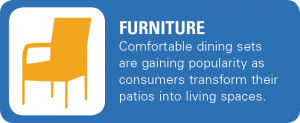 Consumers
Consumers
Having places for guests to sit and relax outside is a high priority for entertaining. Outdoor furnishings are on many consumers’ shopping lists, with 84 percent of households planning to add outdoor furnishings in 2015, up from 62 percent in 2014, according to the AHFA’s report. The outdoor furnishings consumers plan to add are on the following page.
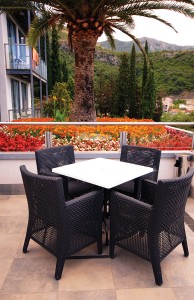 Retailers
Retailers
Outdoor furnishings ranked fifth in outdoor living products that retailers stock in their store and ranked third in total contribution to sales within the category, according to the NRHA 2015 Outdoor Living Trends Study. Respondents noted that while people are looking for high-quality outdoor living products, patio furniture is still price sensitive and customers generally look for sales on these items.
Experts
Landscape architects also recognize seating and furniture for the yard as popular outdoor elements, with 63 percent rating outdoor furniture and seating and dining areas as being extremely popular, behind fire pits, lighting and grills.
The purpose of these seating areas is to create spaces that are inviting sanctuaries, says Industry Edge in its 2015 trend outlook.
“Nothing invites relaxation like comfortable outdoor seating,” according to Industry Edge. “Portable hammocks, two-person swings and table/chair sets encourage consumers to spend even more time with Mother Nature.”
The comfortable, outdoor lounge sofas and chairs are nothing new, but manufacturers are now applying these design aspects to dining areas.
“Many companies added scale or expansion capabilities normally only found in indoor dining groups,” AHFA says. “Long, rectangular tables to accommodate up to a dozen guests are selling well…Dining chairs feature deep cushions along with swivel and rocking motion.”
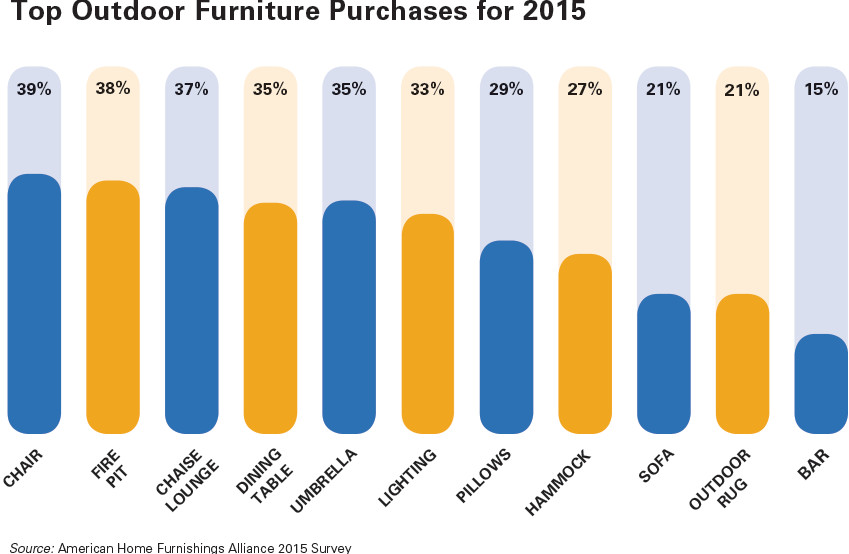
The organization also adds that more outdoor tables are being made of sophisticated materials such as wood grain rendered in durable fiberglass, plankstyle porcelain and lightweight aluminum that can withstand harsh weather.
Other outdoor furniture trends identified by spoga+gafa were related to materials, such as light, modern teak and knittedlooking materials.
“The sofas, chairs and stools designed in these materials radiate coziness and warmth and score highly on the comfort scale,” according to spoga+gafa.
In addition, infrared heating is being added to outdoor dining areas, offering an alternative to fire pits and fire places for warmth, spoga+gafa reports.
 Consumers
Consumers
Of those respondents to the Houzz trends survey who are adding plants to their yards, 92 percent planned to choose plants that are native to their region. The majority of respondents adding native plants are doing so to reduce maintenance and help the environment.
Along with adding native plants, 64 percent planned to add edible plants to their yards, with vegetables being the most popular.
Retailers
Retailers noted a growing interest in fruit and vegetable gardening, as mentioned in the August 2015 issue of Hardware Retailing magazine. Seven different retailers observed an increase in the number of homeowners who are growing edible plants.
This growth aligns with recent interest in organic farming and consumers’ desire to know where their food comes from, especially among young homeowners.
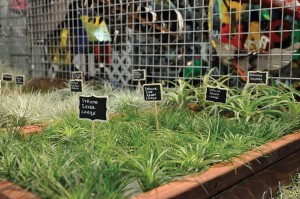 Experts
Experts
Growing native plants and food/vegetable gardens were the most popular projects in the 2015 American Society of Landscape Architects Study, ranking above fire pits and lighting. The fifth design element on the list was low-maintenance landscapes.
“Today’s time-crunched homeowners are increasingly looking at low-maintenance alternatives for their outdoor landscaping space,” Houzz says. “Sod is giving way to increased terracing and bigger mulched planting beds with lowmaintenance plant selections.”
 Hardware Retailing The Industry's Source for Insights and Information
Hardware Retailing The Industry's Source for Insights and Information






